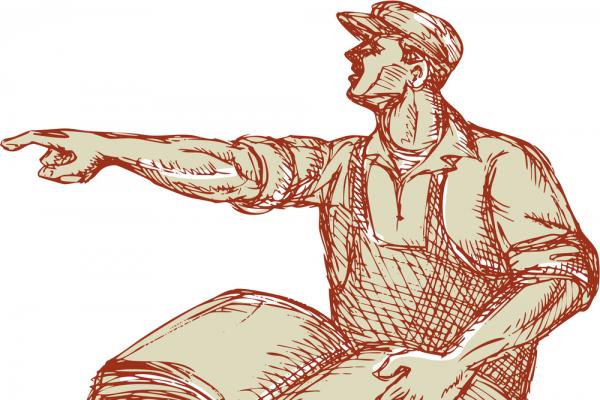WHAT’S NOT TO like about a law called “right to work”?
It is a label that invokes the best of our U.S. national persona: a dedication both to individual freedom and to the important role that our labors play in developing personal character and community prosperity. When Wisconsin Gov. Scott Walker signed a so-called right-to-work law in early March, making his state the 25th in the country to adopt such legislation, he did so on a desk emblazoned with a bold sign saying “Freedom to Work.”
The problem with right-to-work laws is that they are a lie.
For generations, legislation drafted under this label has been promoted by people and organizations whose priorities are not to enhance the autonomy and welfare of our nation’s workers, but to crush them. Aimed at weakening collective bargaining rights, these laws trace their origins beyond the 1980s union attacks led by Ronald Reagan, past the 1940s Southern strategy to beat blacks out of the labor force, to a 19th century “Northern strategy” that equated “collective bargaining with the enslavement of free white men,” according to sociologist Cedric de Leon.
Right-to-work laws prohibit a company and its workers from agreeing that workers who benefit from a union-negotiated contract should pay fees to that union. The only “right” protected is the privilege of workers to benefit from union advocacy without paying for its cost. The goal is to drain the resources of those unions, smothering workers’ ability to collectively bargain for better wages and working conditions.
In addition to the pitch for “individual worker freedom,” right-to-work laws are sold as providing a boost to local economies. “We now have given one more big thing on that checklist to say that Wisconsin is open for business,” Walker said before signing the new law.
But the data do not back up the rhetoric. There is little compelling evidence that right-to-work laws jump-start the economies of states where they have been enacted. By contrast, there is plenty of proof that these laws further impoverish U.S. workers. People living in right-to-work states endure lower wages and higher poverty rates than their counterparts in states with greater freedom for collective workplace bargaining. And though right-to-work laws may boost the number of businesses in a state, the gains mostly go to the owners. “Although right-to-work states may be more attractive to business,” Hofstra University statistician Lonnie Stevans concluded, “this does not necessarily translate into enhanced economic verve in the right-to-work state if there is little ‘trickle-down’ from business owners to the non-unionized workers.”
None of this is surprising. Union membership and collective bargaining help level an otherwise uneven playing field between employees and business owners; as a result, they are well-proven to raise wages and increase access to benefits.
For those of us who are not members of unions, much less dependent on the collection of union dues, why should we be concerned about right-to-work laws?
We may be more reliant on unions than we think. The current record levels of income inequality in the U.S. correspond with a sharp decline in union membership. That inequality drains our tax base, spikes the demand for public assistance, and destabilizes the communities where we live.
The core tenets of our faith demand that we preserve special concern for the struggling workers among us. Drawing from clear biblical foundations (see Jeremiah 22:13 or James 5:1-6, for instance), papal encyclicals vigorously promote the rights of workers to organize and bargain collectively. And labor rights have been a foundation of the Protestant social gospel movement since Washington Gladden took to the pulpit in 1865.
Martin Luther King Jr. carried that tradition into the modern era, where he saw through the right-to-work smokescreen. “In our glorious fight for civil rights, we must guard against being fooled by false slogans, such as ‘right to work,’” King said. “It is a law to rob us of our civil rights and job rights. Its purpose is to destroy labor unions and the freedom of collective bargaining by which unions have improved wages and working conditions of everyone.”
That was in 1961. King’s concluding statement about right-to-work laws is as true today as it was a half-century ago: “We demand this fraud be stopped.”

Got something to say about what you're reading? We value your feedback!
